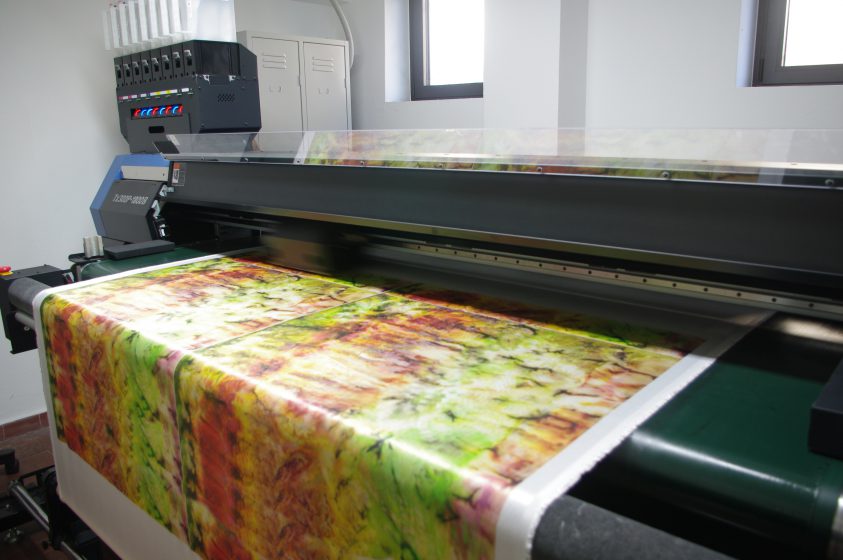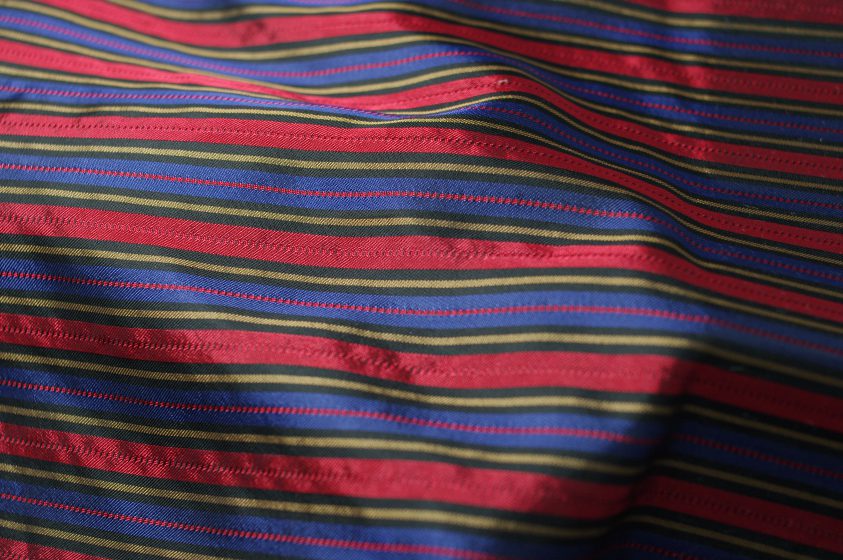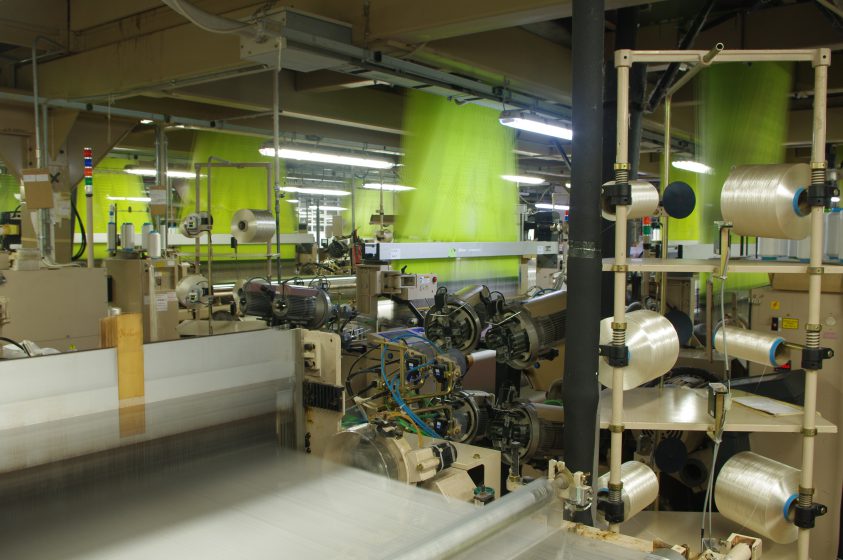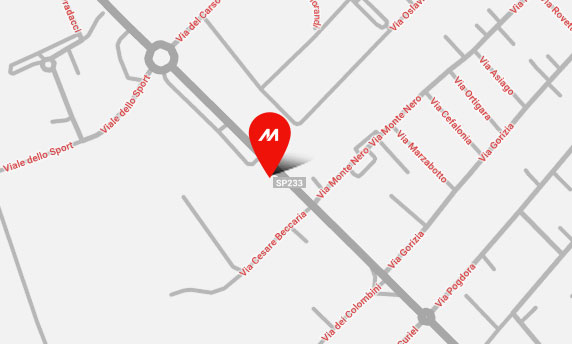Gi.Tessil Foderami specializes in the production of Made in Italy linings and fabrics and is distinguished by the quality of its products and services. By focusing on advanced technologies and sustainable raw materials, the company has established itself as one of the leading suppliers of jacquard linings in Europe and boasts customers of the calibre of Armani and Max Mara. This well-established and highly competitive business, which has always kept a watchful eye on developments in the market, was missing the final element needed to gain a strong advantage over the competition: in-house lining customization, which is increasingly in demand. A gap which the management of Gi.Tessil Foderami has filled by investing in a Mimaki TX300P-1800B digital textile printer.
Development of the company
With over sixty years of history behind it, Gi.Tessil Foderami is a family-run company specializing in the production of smooth and jacquard linings. Now run by the family’s third generation and based in Crosio della Valle, in the province of Varese – close to the Digital Textile Valley of northern Italy – Gi.Tessil Foderami has implemented a strategy of continuous growth, characterized by the diversification of product ranges and international development. “We started out as a national company with a very simple product portfolio, consisting mainly of smooth linings, and we have grown into a European operation with a wide range of products resulting from complex processes, including stretch, printed and jacquard fabrics”, says Paolo Giamberini, the company’s owner and CEO. With a sales network that has strengthened over the years, Gi.Tessil Foderami currently operates across most of Europe, with a major presence in Germany, France, Northern and Eastern Europe. Another cornerstone of its corporate vision is the company’s attention to environmental and social sustainability. With a portfolio of OEKO-TEX® certified products, Gi.Tessil Foderami has also been granted the FSC certification and is a SEAQUAL licensee, carrying out internal research and experimentation on recyclable materials, including polyester, cork and paper.
From a production point of view, the first important turning point in the history of Gi.Tessil Foderami was the decision to focus on jacquard technology as a specialization: “In fact, Gi.Tessil Foderami is recognized as the company that knows how to make jacquard linings, a product with great added value compared to basic linings. We have invested heavily in this technology over the years, so much so that we now have 28 jacquard looms. This focus on the most advanced technologies has prompted us to closely monitor the development of digital printing, a process of which we immediately understood the significance and potential of, in terms of integration with our core business.”
In order to meet the constantly evolving needs of its core market: tailors in the women’s and men’s clothing sector, over time Gi.Tessil Foderami has invested in improving its service, which is now renowned for its quality, promptness and punctuality. Driven by a corporate vision focused on experimenting with the most innovative technologies to maintain and implement its own high standards, the management has decided to take a further step forward and invest in digital textile printing.
A quantum leap with digital printing
“Working with jacquard technology, designs and variations have always been part of our work. With the increased demand for customization, we understood that the time had come to cross a new frontier”, explains Giamberini. “We are weavers and until a year and a half ago we had no experience in printing. We used external suppliers to meet our customers’ printing requirements, but this had an impact on delivery times and consequently on service. We therefore decided to bring the technology into our home and integrate it into the production process”.
After evaluating a number of digital printing systems available on the market, the management chose the Mimaki TX300P-1800B, a direct-to-fabric belt-fed printing solution with pigment inks purchased from Mimaki Bompan Textile. “One of the aspects that prompted us to choose this solution was the ease of use. And in fact, even though we were starting from scratch and having to gain all the basic knowledge about digital printing, we have always managed to satisfy customer requirements with the TX300P-1800B”, says Gianluigi Girola, R&D and digital printing department manager. “We experimented a lot to work out how best to set the printing parameters. Both the support provided by Mimaki Bompan Textile and the technical webinars arranged by the company were very useful for this purpose.”
Installed in summer 2019, the Mimaki printer is today a strategic part of Gi.Tessil Foderami’s production process. The company uses the TX300P-1800B to make samples and small production runs – from a few hundred meters to the extreme customization of unique garments (5-10 meters). Many customers provide their own designs, but Gi.Tessil Foderami has also prepared its own book, with around a hundred suggestions on different media, which is available to people contacting the company. “This printer allows us to work very quickly. We receive the design or a request for one of the designs in our book, prepare the file, send it to print and deliver the product – sometimes within twenty-four hours.” According to Girola, an efficient graphics company, the production speed and the quality of the printed matter have brought further added value to the company’s service: “By adding the Mimaki printer, we have made an extra service available to our customers, becoming a one-stop-shop for anything related to the supply of linings. This is an important competitive advantage over our competitors, none of whom offer this service.”
Instrumental to the speed of service was the decision to set up the printer with Mimaki’s pigment inks. As they require no pre-treatment of the fabric or post-treatment of the print, these inks help to make Gi.Tessil Foderami’s printing process very fast indeed. “These pigments were the best choice for us, because it fully meets our operational needs. The process is simple, the resulting quality fulfills our customers’ requirements, and it allows us to print on all the fabrics in the range, from silk to viscose and mixed fibers like viscose and acetate,” adds Girola.
The experience of using the Mimaki TX300P-1800B over the first few months has been very positive according to Paolo Giamberini. “From an application point of view, we have managed not only to achieve the initial goals, but to go even further. Alongside the on-demand printing of our fabrics, many customers who have tried our printing service have begun to ask us to print the same motifs on fabrics supplied by them for applications such as protective masks. And at a time like this, that is certainly good news.” Considering these new business opportunities and looking at future scenarios, Giamberini concludes: “The Mimaki TX300P-1800B is a flexible and multipurpose solution which, in my view, has a production potential of about 14,000 meters per year. We haven’t reached its full potential yet, but two fundamental factors need to be considered: as a completely new technology for the company, it has taken us time to promote it to customers, and the COVID-19 pandemic has slowed down the whole project. Considering that we have not yet had the opportunity to officially present our book, we are convinced that, once the COVID-19 pandemic is over, we will be able to fully exploit the potential of this machine, at which point we will consider making a second investment in this area.”






